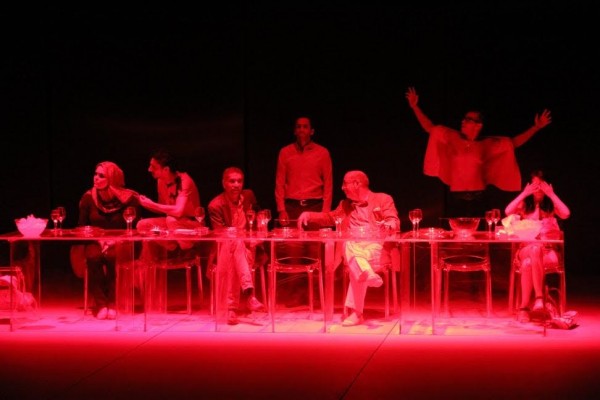By: Ahmed Hosam
@ahmedhrefai
![The dinner table being the only set in the production seems to allude to a limbo in which the higher class is forever occupying themselves with the superficialities of splendor and travel, and money-making schemes [Yasmin Shaheen]](http://www.auccaravan.com/wp-content/uploads/2016/10/A-Scene-from-The-Last-Supper-e1476179063180.jpg)
Ahmed El-Attar offers a starkly biting commentary on the contemporary higher-class Egyptian family in the second run of his latest work: “The Last Supper”.
“The Last Supper”, debuted in 2014, and was met with overwhelmingly positive reviews.
The play, which ran from 22 to 26 September in the AUC Falaki Theater downtown, drew a near full-house in almost every one of its performances.
The colloquial Arabic production has toured a number of European, Asian, and Arab countries since 2014.
In just under 50 minutes, the one act play paints a sharp, almost condemning portrait highlighting the all-familiar – and as Attar says, often destructive – mannerisms prevalent in privileged Egyptian families. It is a dismal work of social commentary intelligently encased in humor.
Each member of the family of eight seems to be a garish caricature: the business mogul father-in-law, army general grand-father, and the extravagant and obnoxious teenage son with the superficial wife are only a few of these characters, whose stereotypical whims make them a manifestation of the ailments of Egyptian society.
The deliberately exaggerated performances by the adept cast really make the caricature come to life. Sitting around a dinner table for the entirety of the play, they engage in endless trifling conversation while being served by a team of butlers. The play is riddled with Marxist subtext, addressing the power struggle within the rich Egyptian family and their subjugation of the working class.
The dinner table being the only set in the production seems to allude to a limbo in which the higher class, the miniscule percentage of the population supposedly behind the wheels, is virtually stuck in, forever occupying themselves with the superficialities of splendor and travel, and money-making schemes.
“In Egypt, we tend to blame the poor and uneducated for everything, when that is basically why they cannot be blamed,” El-Attar told The Caravan.
“The people to be blamed are those who have everything, but are shallow, racist, brutal, classist, and sexist. […] people are relieved that someone is expressing that,” he continued, speaking on the success of the play.
Devoid of any real plot, “The Last Supper” is an intentionally hollow work. The trivial quarrels and conversations – almost abstractly impressionist in their discordance and overlapping – do not serve a dramatic purpose, nor are they explicitly resolved.
It instead seems, however, that they are intended to create an organic flow of dialogue from which the viewers are left to draw their own conclusions.
Right in the center of the set, above the dinner table, English subtitles are projected whose purpose seems to be, aside from translation, to help the viewer discern the important dialogue from side conversations.
“The Last Supper” is El- Attar’s anticipated return to theater, and his 12th stage production. El-Attar, fortunately, says it is good to be back. “I haven’t written a play since 2000, […] so this is almost my comeback to writing, which is great, I like writing,” he humorously remarked.
But as much success as the play – which had recently been touring in Singapore – enjoyed with Egyptian audiences, some viewers were left confused as to what exactly the play wanted to say. Several comments on social media showing confusion and dissatisfaction point to what El-Attar describes as a “non-understanding” of his brand of theater.
“I don’t use a narrative form, there’s no drama, nothing happens, no action or reaction, nothing is said,” he commented, adding that he is unable to do it the traditional way.
This style of theater, reminiscent of the French “théâtre de l’absurde”, is unconventional to the Egyptian taste, but El-Attar says this peculiarity is a necessary agent of social change.
“Getting used to the multiplicity of the human mind and voice is something very important in Egyptian society and all countries under oppressive rule, because the main concept of that kind of totalitarian rule which we’ve been living under for over 60 years is that there is only one way of doing things” he said.
“So I think it’s important that we hear all these voices.”
